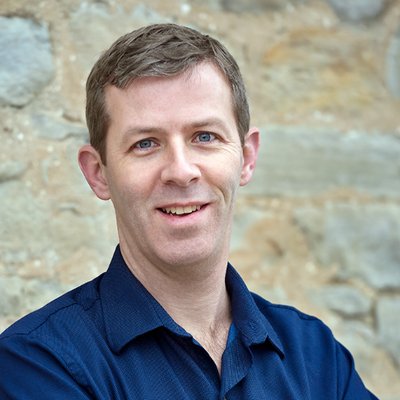Professor Spotlight: David Richeson

Professor of Mathematics David Richeson has been teaching at Dickinson college for 19 years now, and is currently teaching a course on single variable calculus. He received his undergraduate degree at Hamilton College and a Ph.D. from Northwestern University before taking a postdoctoral position at Michigan State University.
He is also the editor of Math Horizons, a national math magazine aimed at undergraduate students. Richeson has been working for Math Horizons for five years now.
When asked when his interest in math began, Richeson responded with a short anecdote. “My parents were cleaning up the basement recently and as they did, they found my report card from 1st grade. It said, ‘David particularly enjoys math.’ I was always very interested in puzzles and games, logic puzzles and things, which I now recognize was closely related to math,” he said.
Richeson was initially exposed to puzzles and games by his father, who he considers a “local mentor” for his passion for math. In addition, author for Scientific Magazine, Martin Gardner, also piqued Richeson’s interest in math and puzzles.
Richeson enjoys a variety of aspects of math including problem solving. “As for specific areas, I’m really interested in the history of math, how some things take years and centuries to fully develop; it’s really fascinating to learn about the people behind these discoveries,” he said.
“I also love analyzing puzzles and games, a branch of math called recreational math, and using math for arts and crafts; it’s really fun.” Richeson focuses mostly on topology and dynamical systems, the same topic he completed his Ph.D. thesis on.
Richeson knew that he wanted to teach for many years, and he has particularly enjoyed getting the chance to work at a small liberal arts institution, much like the one he attended for undergraduate. “I taught for Michigan State for two years as a postdoc, and I had a mini lecture with 150 students. Although I enjoyed certain aspects of it, it was quite different from being here, and I think it reinforced my belief on coming here,” Richeson said.
Currently, Richeson is working on a history of math book titled Tales of Impossibility which focuses on four major issues that the Greeks were attempting to solve around 300 B.C. that is set to come out in October. Richeson was surprised that, as a mathematician, he would end up writing as well. “I grew up thinking that I was a math person and not a writing person, but turns out you can do both,” he said.
As Richeson discovered, these problems cannot necessarily be solved, although that discovery, Richeson said, was not made until the 19th century. “For example, [it] turns out if you have an angle, you can bisect it using a compass and a straight edge, but you can’t trisect the angle (divide it into 3 equal parts).” He added another example that is discussed in his book. “Another very famous problem is squaring the circle; you have a compass and a straight edge, can you draw a square that has the same area as a circle? Turns out you can’t do that either. That one has to do with the fact that Pi is a transcendental number. So it’s a history of these four problems for 2000 years.”
Richeson acknowledges that many people tend to shy away from math due to a negative experience, he encourages people to give it another chance. “Math comes in many varieties: there’s puzzles and games, there’s logic, there’s calculus, there’s statistics…Students tend to think of math as this curriculum that you walk through,” he said.
In addition, while Richeson understands that math is often thought of as a textbook subject, he notes that there are a variety of “popular books that present math in a more fun, engaging and accessible way.”
Richeson also suggests that people try and consider math as a necessary, daily thing. “[M]ath has a very human face. This was all created by people. The story behind how math was created is also very interesting. I think a lot of people would be drawn to math if they could learn about the history of some of these famous mathematicians,” he added.
If you are interested in fun math puzzles and problems you can follow Professor Richeson’s blog at https://divisbyzero.com/ or his Twitter page @divbyzero.


